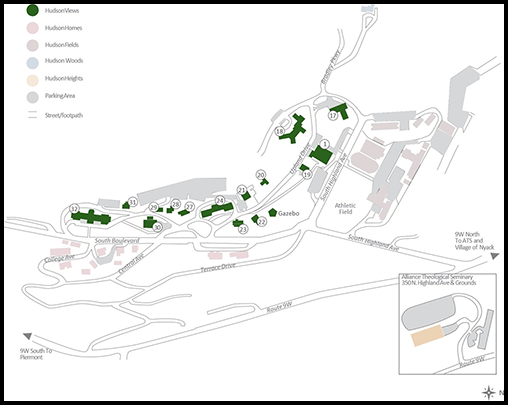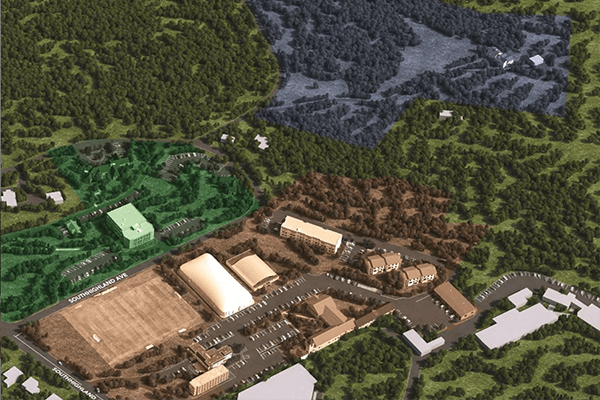Zoning Rules Limit Future of Nyack College Campus
NEWS ANALYSIS
By Tina Traster
CBRE this week issued an RFP without an asking price for the sale of Nyack College.
The college is seeking a buyer for the 40-property portfolio spread over 107 acres. The college is willing to sell all its holdings to one entity, or break up the sale into parcels, and is seeking proposals from both buyers who would use the existing property and from master developers who would seek to change its use.
 Legislators, planners, and citizens have shown an intense interest in steering the future of these parcels, particularly the nearly 50 acres where some 38 college buildings are located. But South Nyack, which hosts the lion’s share of the college campus, has the power to wield significant influence over the outcome of the sale, and the future of the property because it is the zoning authority.
Legislators, planners, and citizens have shown an intense interest in steering the future of these parcels, particularly the nearly 50 acres where some 38 college buildings are located. But South Nyack, which hosts the lion’s share of the college campus, has the power to wield significant influence over the outcome of the sale, and the future of the property because it is the zoning authority.
The buyer of the land has a one-year window from the day Nyack College shut down its operation to preserve the right to continue its nonconforming use and operate an educational campus.
There’s a mixture of hope and concern as to the future use. Many would like to see another learning institution replace Nyack College. There’s been some chatter about interest expressed by RCC in Suffern. Some prefer to see housing; others worry density housing will tax village services and schools.
RCBJ last reported the college was looking to sell all its holdings for $100 million. Facing mounting debt, Nyack College recently took out a $38.5 million loan against its South Nyack campus from 100 Mile Fund LLC, owned by Procida Funding & Advisors, a non-bank lender.
The four-year, private Nyack College is moving its students to its Manhattan location.
What we should keep our sights on is whether South Nyack’s Board of Trustees acts pre-emptively to alter the land’s zoning.
Nyack College has a “nonconforming use permit” to occupy the bucolic land that is zoned for 18,000-square-foot residential lots. According to the village code, the buyer of the land has a one-year window from the day Nyack College shut down its operation to preserve the right to continue its nonconforming use and operate an educational campus. Once the year mark passes, the land reverts back to R-18, or residential zoning.
The zoning code also says the new owner must re-apply for a non-conforming use permit within 90 days of the closing, which would likely be granted unless the Village Board enacts legislation to phase out the use.
So what does this mean? If an educational institution wants a smooth transition, it would need to have a sale wrapped up by the end of the year. An intent to operate as a nonconforming use is not adequate to preserve its status.
If the land does revert back to R-18, a prospective developer could propose single-family housing but multi-family housing with density would require a zoning variance, or a change of the zoning code by Village trustees.
Watchers are waiting to see if the Village Board maintains the nonconforming use, or whether it takes steps to change the zoning in advance of a potential sale.
The same scenario is playing out on Nyack College’s 36-acre parcel where the Alliance Theological Seminary on Route 9W in Upper Nyack and Clarkstown is located. Here too there’s a one-year timeline before the nonconforming use reverts back to R-160 conservation zoning, which allows for a minimum of five-acre lots.
Technically, the college campus is two parcels. The main parcel houses 38 campus buildings, but there’s a 22-acre portion of land, ripe for development, in the northwestern corner located in Orangetown. This site is undeveloped except for the 1774 Bradley Estate, which housed the college president. It it zoned R-80, which permits single-family detached residences on 80,000 square foot lots, as well as churches, libraries, schools and limited agricultural use, requiring five-acre lots.










